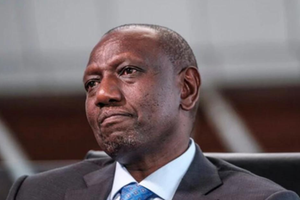
President William Ruto (right) chairs a Cabinet meeting at State House in Nairobi on September 17, 2024.
President William Ruto has set new ambitious targets for his newly appointed Cabinet Secretaries (CSs), placing them under immense pressure to deliver.
The tough targets are part of President Ruto’s latest struggles to deliver on the many lofty promises made in the run up to the 2022 General Elections, some of which are yet to be honoured two years since assuming office.
It is also seen as a response to the youths who went to the street over poor performance by the previous Cabinet. The 22 Cabinet Secretaries have all been handed a year to deliver specific priority projects under five key pillars of Agriculture, universal health coverage, a digital superhighway economy, affordable credit as well as manufacturing and value addition.
A host of CSs and their Principal Secretaries (PSs) have formally committed to achieve specific deliverables in an ongoing performance contracting for ministries and state departments.
Office of the Prime Cabinet Secretary and the Ministry of Foreign Affairs and Diaspora Affairs under Mr Musalia Mudavadi, CSs Eric Muuga (Water, Sanitation and Irrigation), Andrew Karanja (Agriculture), Wycliffe Oparanya (Co-operatives and MSMEs), Alice Wahome (Lands, Public Works and Housing) and Salim Mvurya (Investment and Trade) are some of the CSs who have since negotiated and validated projects to be delivered under the provided timeframe.
The process is supervised by Deputy Chief of Staff in the Executive Office of the President responsible for Performance and Delivery Management in Government, Mr Eliud Owalo, and the Secretary to the Cabinet Ms Mercy Wanjau.
In his docket, CS Muuga has committed to increase the area under irrigation to 773,069 acres. The ministry plans to have 40,000 additional acres under irrigation by June. It also committed to harvest 166,726,736 M3 water to be used for irrigation.
The ministry also plans to increase paddy rice production to 250,000 tons. This it says will generate a crop value of Sh23 billion and bridge the rice deficit.
“The ministry will focus on increasing national water coverage to 74.5 percent which is a 1.5 per cent increase in water coverage thus connecting over 2.5 million people to clean and safe water.
The ministry plans to reduce Non-Revenue Water levels to 40 per cent from 43 per cent (a 3 per cent reduction). This will lead to the recovery of Sh2 billion revenue from Non-Revenue Water,” the CS committed.
In its list of achievements, the ministry said it increased the area under Irrigation from 664,000 in 2022 to 733,069 in 2024. The increase was as a result of 47,933 acres being realised in 2023 while an additional 21,136 acres were realized in 2024.
“As a result, over 100,000 farmers generated a crop value of Sh17.3 Billion and 345,000 jobs were created,” said the CS.
Under Mudavadi’s docket, the ministry said it grew diaspora remittance from Sh400 billion in 2022 to Sh607 billion in 2024 even as it committed to strengthen diaspora engagement through a Diaspora Investment Strategy, an investment information platform, a Remittance conference and a Diaspora Bond.
“Improve consular services and diaspora welfare with repatriation, mobile services, safe houses, a diaspora growth strategy and a mental wellness plan. Strengthen public diplomacy by publishing reports on Kenya’s international treaties and obligations,” the ministry committed.
CS Wahome committed to have her ministry construct 66,155 affordable housing units to various levels of completion as well as 52,758 social housing units to various levels of completion by June.
The ministry further commits to construct 41,964 housing units consisting of 24,152 for the National Police Service, 10,033 for Kenya Defence Forces and 7,779 for student accommodation to various completion levels.
Also to be achieved in the current financial year is registration and issuance of 280,000 title deeds covering all the 47 counties.
“The Ministry commits to develop a Land Value Index for three (3) more counties namely: Migori; Homa Bay and Lamu to guide the compensation for infrastructure projects, guide investment and curb speculation on land,” states the document.
Ms Wahome also committed to decentralize land services by opening four new land registries in Malindi, Kajiado South, Gilgil and South Imenti.
Mr Karanja committed to facilitate provision of subsidized fertilizer as a way of enhancing production of maize and other crops across the country. The CS committed to have at least 12.5 million bags of fertiliser distributed to farmers by next year. The ministry further committed to register an additional 200,000 farmers on the e-voucher system.
“To enhance value addition, market access and competitiveness of the dairy industry, the Cabinet Secretary through the Livestock Value Chain Support Project commits to install 210 bulk milk coolers in 36 counties,” Mr Karanja said.
The document adds, “To increase market access for livestock products in line with the Bottom-Up Economic Transformation Agenda on agricultural pillar, the Cabinet Secretary commits to improve food safety for foods of animal origin by having 15 milk processing plants, eight export slaughter houses.”
Construction of eight grain aggregation, drying and storage facilities at Kibuline, Mbeu, Mwendi Urithi Lailuba (Meru County); Mogogosiek (Bomet County); Matayos (Busia County); Suwerwa (Trans Nzoia County); and Bakule and Moiben New Progressive FCS (Uasin Gishu County) are also part of the ministry plan to mechanise agriculture across the country.
Under the Trade docket, Mr Mvurya committed to coordinate the implementation of the Buy Kenya-Build Kenya initiative. The ministry also committed to fill up export processing zones and complete the operationalisation of four more. It further seeks to develop an e-commerce policy and a digital services export strategy.
“In order to nurture SME exporters with the majority local Kenyan shareholding in the Horticulture/Food Processing, Textile/Apparel, Leather, Commercial Crafts, BPO and ICT sectors, the Ministry commits to complete the development of and operationalization of Four (4) Flagship Export Processing Zones projects as well as the construction of 19 County Aggregation and Industrial Park (CAIPs),” committed the ministry.
On his part, Mr Wycliffe Oparanya committed to waive coffee debts worth Sh2 billion in the current financial year as well as ensure participation in national and international coffee trade fairs to promote the produce. The ministry also committed to enhance access to affordable financing for MSMEs, as well as enable the strengthening of governance framework and policy reforms to create a conducive business environment for MSMEs.








